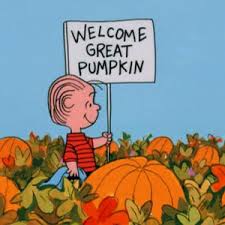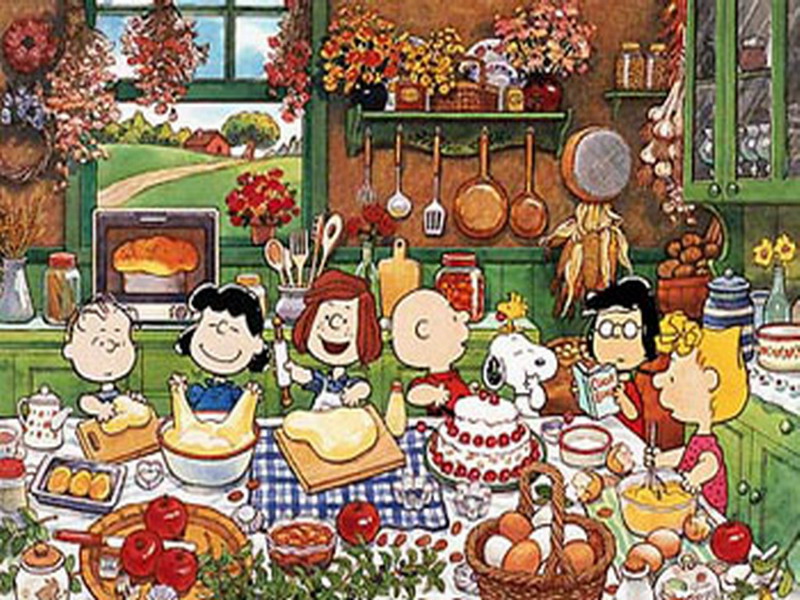A Homily based on the readings for Thanksgiving Day: Deuteronomy 8.7-18, Psalm 65, 2 Corinthians 9.6-15, Luke 17.11-19
 One of my favourite Peanuts comic strips has Charlie Brown, Linus, Lucy and the gang waiting in the pumpkin patch at night, hoping to see the Great Pumpkin when it arises. (Now you may think this has more to do with Halloween than Thanksgiving, but in Canada, where Thanksgiving comes before Halloween, the Great Pumpkin has to rise early.) Linus is holding up a big sign that says “Welcome Great Pumpkin” and he says:
One of my favourite Peanuts comic strips has Charlie Brown, Linus, Lucy and the gang waiting in the pumpkin patch at night, hoping to see the Great Pumpkin when it arises. (Now you may think this has more to do with Halloween than Thanksgiving, but in Canada, where Thanksgiving comes before Halloween, the Great Pumpkin has to rise early.) Linus is holding up a big sign that says “Welcome Great Pumpkin” and he says:
“Each year, the Great Pumpkin rises out of the pumpkin patch that he thinks is the most sincere. He’s gotta pick this one. He’s got to. I don’t see how a pumpkin patch can be more sincere than this one. You can look around and there’s not a sign of hypocrisy. Nothing but sincerity as far as the eye can see.”
I think that this gathering of friends for the annual St. John’s Convent Thanksgiving celebration is the most sincere pumpkin patch I have ever seen. None of us can make a claim to fame or fortune. We’re just ordinary people, travelling the peaks and valleys of our lives in partnership with each other and our loving God. But we treasure our friendship with one another as we treasure the feast of sincerity and truth that Christ offers us at this communion table. That’s really our only reason for being here. And while that might not be all of what it means to be sincere, it’s a big part of it.
We have no ulterior motive, no hidden agenda. In a world where alternate facts compete with sincerity and truth, and where violence and greed are the complete opposite of giving thanks, we come together here just because we’re invited to God’s table in Eucharistic fellowship with each other. And Eucharist in Greek means thanksgiving. So we come to the table together, and we extend that communion to the Refectory table – just because we want to celebrate the friendship of Jesus in our own little pumpkin patch.
Now we’re not perfect, of course, but sincerity is not about perfection. It’s about vulnerability, about being who we really are with one another rather than putting on a perfect face as we share our hopes and fears, our anxieties and joys. We all sin and fall short of the glory of God, as Paul says. But we are all headed in the same direction, trying our best to follow Jesus in a world where that is so difficult to do. So rather than think of sincerity as some kind of impossible goal of perfection, I find it helpful to think of it as single-mindedness, one heart and mind with one common focus.
Sincerity has many expressions, and they are beautifully reflected in the readings this morning in some of the riches passages of scripture. I want to name four: remembering, humility, generosity, and gratitude.
The reading from Deuteronomy challenges us to remember as we listen to God’s promise of bounty as the people of Israel prepare to enter the promised land – it’s an almost utopian vision of plenty and beauty and abundance. But it comes with a charge – to “remember” or “not to forget.” Those words are repeated many times in the passage and throughout the book of Deuteronomy, where they are a major theme:
“Take care that you do not forget the Lord your God or his ordinances and statutes. Never forget the Lord your God who brought you out of slavery in Egypt and provided for you in the wilderness. Remember the Lord your God so that your God will confirm the covenant made with your ancestors.”
So that is the first important expression of sincerity – a sincere pumpkin patch is one where the gathered community remembers the past and celebrates in the present – and that in fact is what the Eucharist is about. “Do this in remembrance of me,” Jesus said.
In the Psalm we have another important expression of sincerity, and that is humility. I use the word in the literal sense of the Latin root, humus or “earth,” “dirt.” The Psalm reminds us that we are creatures, made of the earth, co-inheritors and protectors of the plants and animals, the soil and air and water.
“By your strength you established the mountains; you are girded with might. . . . You crown the year with your bounty; your pastures overflow; the valleys deck themselves with grain, they shout and sing together for joy.”
We are part of the earth, part of God’s creation. Being humble means recognizing that we are not the creators, we are creatures and as such we have a responsibility to nurture this beautiful planet God has given us for our home.
In Paul’s second letter to the Corinthians, we are charged with another manifestation of sincerity, and that is generosity – not only being generous with our food and the provisions we need for our life – but in our ministry, in sharing the gospel:
“Through the testing of this ministry,” Paul says, “you glorify God by your obedience to the confession of the gospel of Christ and by the generosity of your sharing with them and with all others, while they long for you and pray for you because of the surpassing grace of God that has been given you. Thanks be to God for this indescribable gift!”
The indescribable gift that Paul is talking about is the gift of God’s grace – the offering of God’s very self in Christ’s crucifixion and resurrection. Being sincere means that we are generous in sharing that indescribable gift.
And finally, in the gospel Jesus enjoins us to a fourth expression of sincerity, and that is the word we most associate with this Thanksgiving Day – gratitude. Only one of the lepers that Jesus healed came back to thank him and to praise God. Jesus says to him, “get up and go on your way; your faith has made you well.” Now the other nine were healed as well so why does Jesus say that this tenth leper was made well by his faith? I think Jesus is talking of being made well in a more holistic sense – he was not just cured of his leprosy, but he was made a new creation, whole in every way.
Remembering, humility, generosity, and gratitude – these are the spiritual gifts of sincerity. In the Eucharistic prayer – what is called the prayer of thanksgiving – we will remember all that God has done for us; we will recognize in humility that we are creatures of the earth, not the creator; we will be generous in offering ourselves to God as we receive God’s generous gift to us, and we will express gratitude – in fact the very word Eucharist means “thanksgiving.”
So in our remembering, our humility, our generosity, and our gratitude – in our little pumpkin patch in this corner of our God’s kingdom – “let us celebrate the feast with sincerity and truth,” as we give thanks for the humble piece of bread and sip of wine we will receive as a manifestation of God’s indescribable gift to us and for the meal that will extend our feast from this table to the Refectory table.
Rev. Sister Constance Joanna, SSJD


